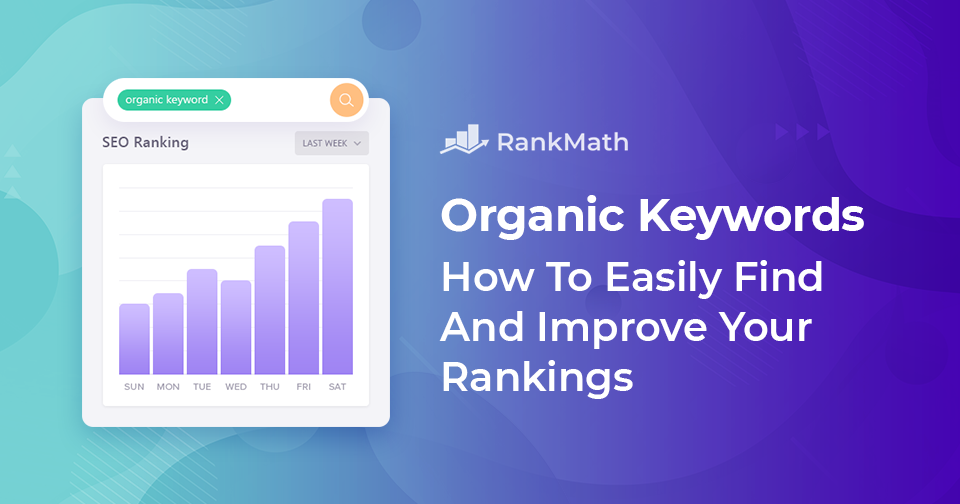The modern-day web has now become impressively competitive. And there’s no denying the importance of search engine optimization, whether you’re a digital marketing professional, an entrepreneur assisting other businesses in growing their online presence, or an ecommerce website owner looking to improve your brand (SEO).
With that said, organic keywords are an important cornerstone of an effective SEO strategy.
Organic keywords are search terms used in search engine optimization to attract free website visitors. Users can find your website without clicking on an ad if you use an organic keyword.
In simple words, they are utilized in search engine optimization to garner organic traffic. You can further rank for a featured snippet if you’ve optimized it correctly.
So, are you ready to learn how organic keywords can boost your website traffic and make it easier to attract new clients? Without further ado, let’s get started.
Table Of Contents
- What Are Organic Keywords
- How to Find Organic Keywords
- How to Improve Your Ranking for Organic Keywords
- Create Stellar Content
- Avoid Keyword Stuffing
- Optimize the Page Titles and Metadata
- Increase Internal and External Links
- Add Alt Tags for the Image Links
- Create Cornerstone Content
- Your URLs Matter
- Optimize and Update the Content
- Conclusion
1 What Are Organic Keywords?
An organic keyword is used in search engine optimization to attract free visitors. These keywords are free to target, whereas paid keywords pay money to rank in the search engines.
Organic Keywords will give you the biggest bang for your buck. For example, your business doesn’t have to find funds in your budget to provide your team with a monthly ad spend. All you need with organic search is time. This time commitment might include everything from learning SEO basics to developing a strategy to writing optimized content.
You’ve probably worked with organic keywords if you’ve ever crafted a blog post around a primary keyword or added specific search terms to a page’s meta description.
The list of links that appear below the advertisements when you type a query into Google or another search engine is known as “organic results.” These are completely based on the page’s quality and content.
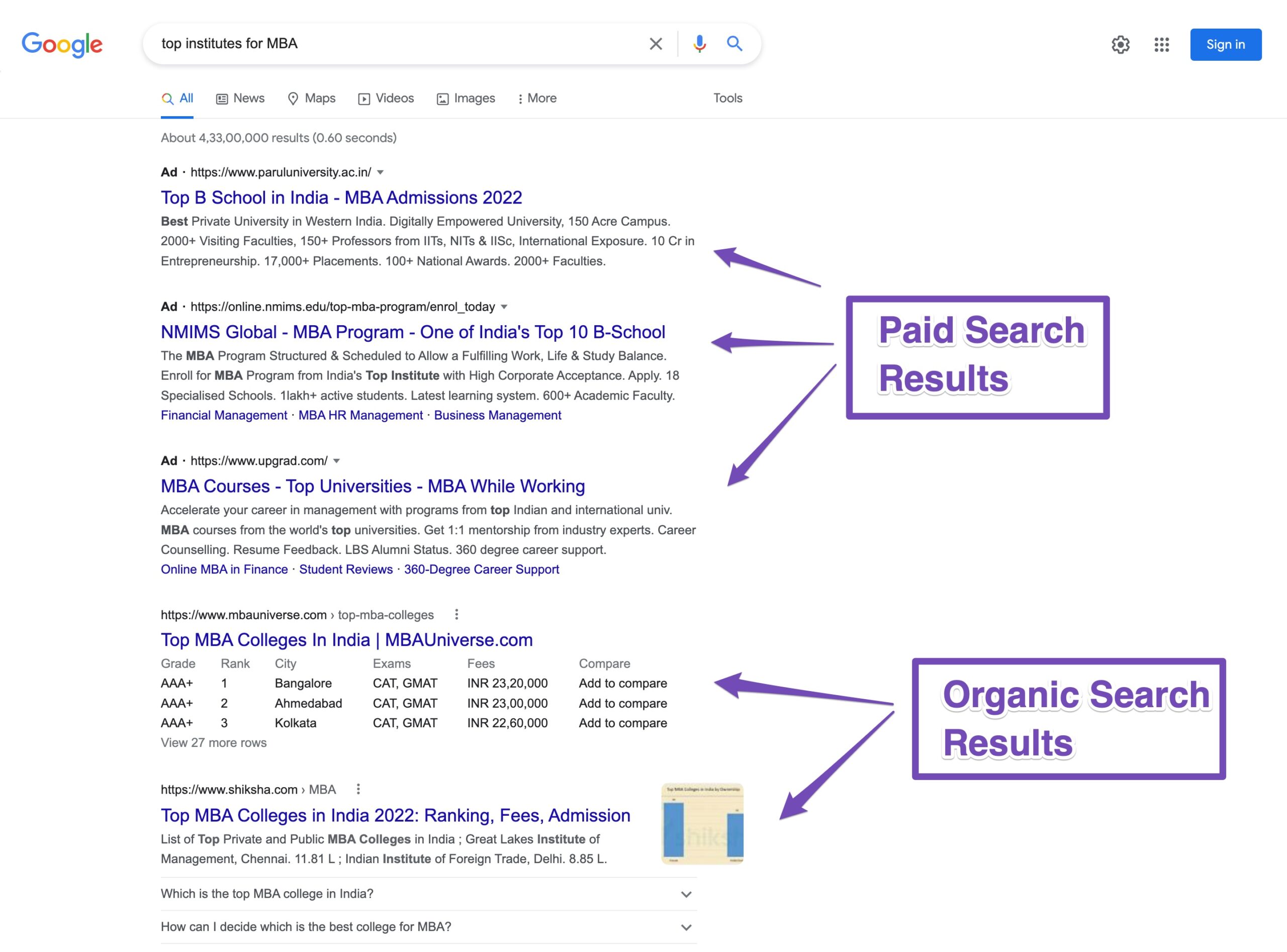
“Organic search” traffic, or simply organic traffic, is traffic that comes from users finding your links among these results. The traffic from organic keywords is important for attracting unpaid website traffic and increasing your site’s visibility in search engines.
But how do you find these keywords? That’s exactly what our next section is all about.
2 How to Find Organic Keywords
Organic search is an extremely effective marketing tool. Google alone receives over 4.5 billion queries per day! So, how can you divert part of that traffic to your own website?
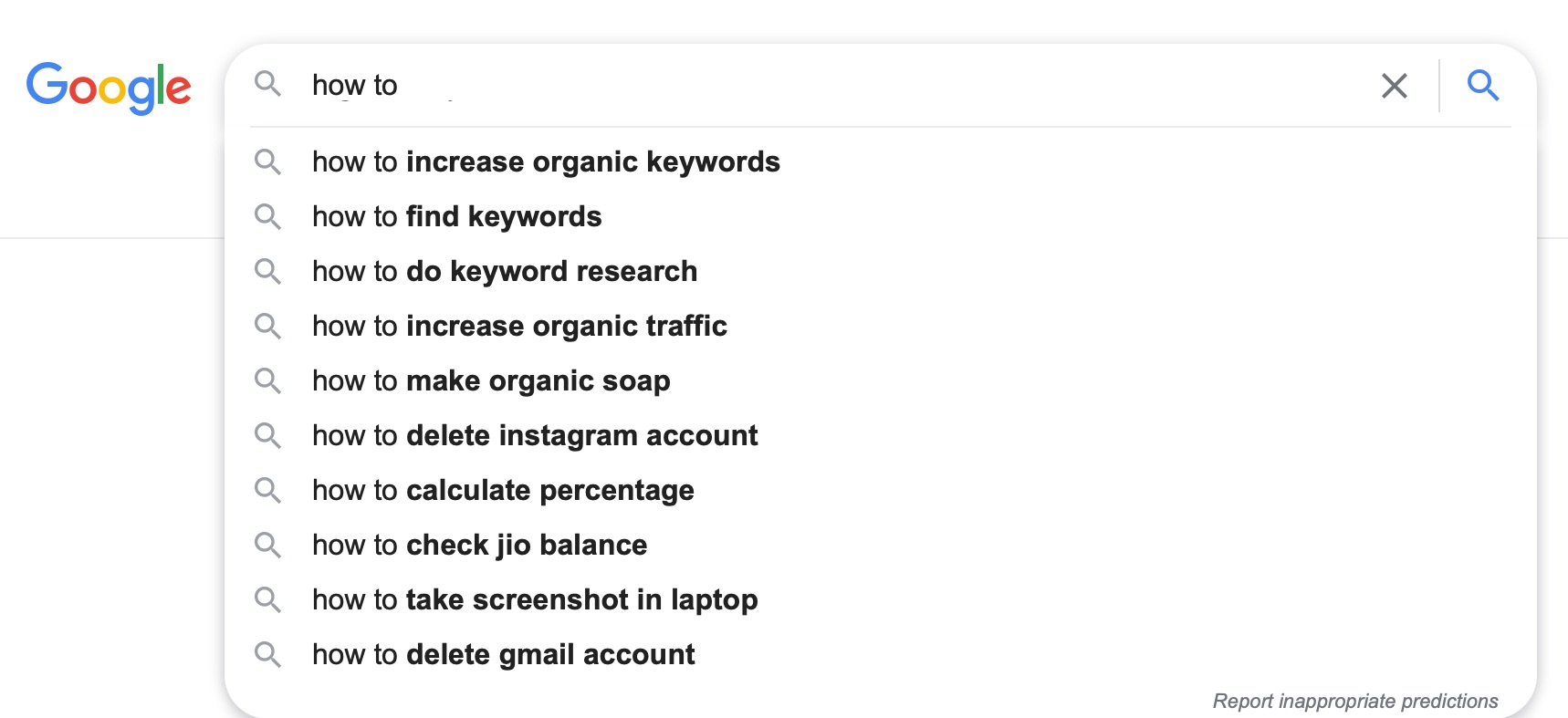
You must optimize your online content for organic keywords to drive visitors from organic searches. These are the terms users use to search for information and solutions to their problems on Google.
Despite Google tweaking its algorithms, on-page keyword optimization is one of the most important factors in Google’s ranking algorithms. If the keyword that people are looking for isn’t mentioned anywhere in your web copy, you’re unlikely to rank for it.
This is why keyword research is crucial: You must identify the keywords people use to search for content, products, or services similar to yours to optimize your web pages for those organic keywords.
It’s not enough to make wild guesses about which keywords to use in your site’s content. It would be best to utilize organic keyword tools to find real keywords to boost your organic traffic strategy.
We’ll walk you through a few strategies for researching and discovering organic keywords that will ultimately drive traffic to your platform.
2.1 Use Google Analytics 4
You can use Google Analytics 4 to identify the potential organic keywords that drive traffic to your site.
You then need to follow the below-mentioned steps to view your keywords data in GA4:
- Connect your website to Google Search Console (if you haven’t done so already).
- Link your Google Analytics 4 web data stream and your Search Console website property.
- Add the Google Search Console report to GA4’s report navigation.
Let’s look at each step in detail.
2.1.1 Connect Your Website to Google Search Console
You need to connect your website with Google Search Console. For instance, you may examine how your website is listed in search results, which searches result in clicks, and how those clicks affect user behaviour, such as which landing pages have more user engagement and the proportion of users that convert.
2.1.2 Link Google Analytics 4 and Search Console
Once you’ve verified your website and connected it to Google Search Console, the next step is to connect Google Analytics 4 and Search Console.
In Google Analytics 4, navigate to Admin → Property.
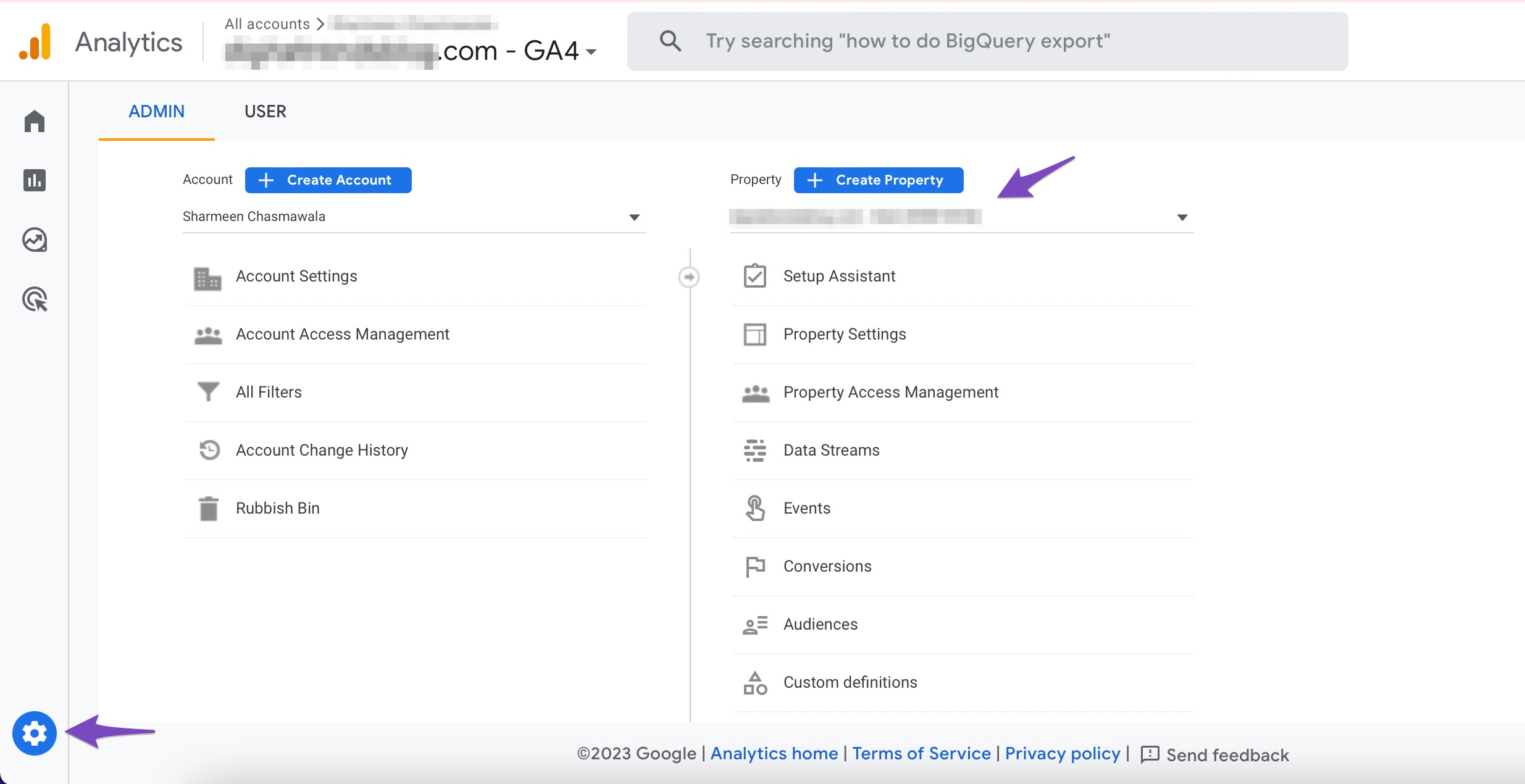
In the property column, scroll down to PRODUCT LINKS, and select Search Console links, as shown below.
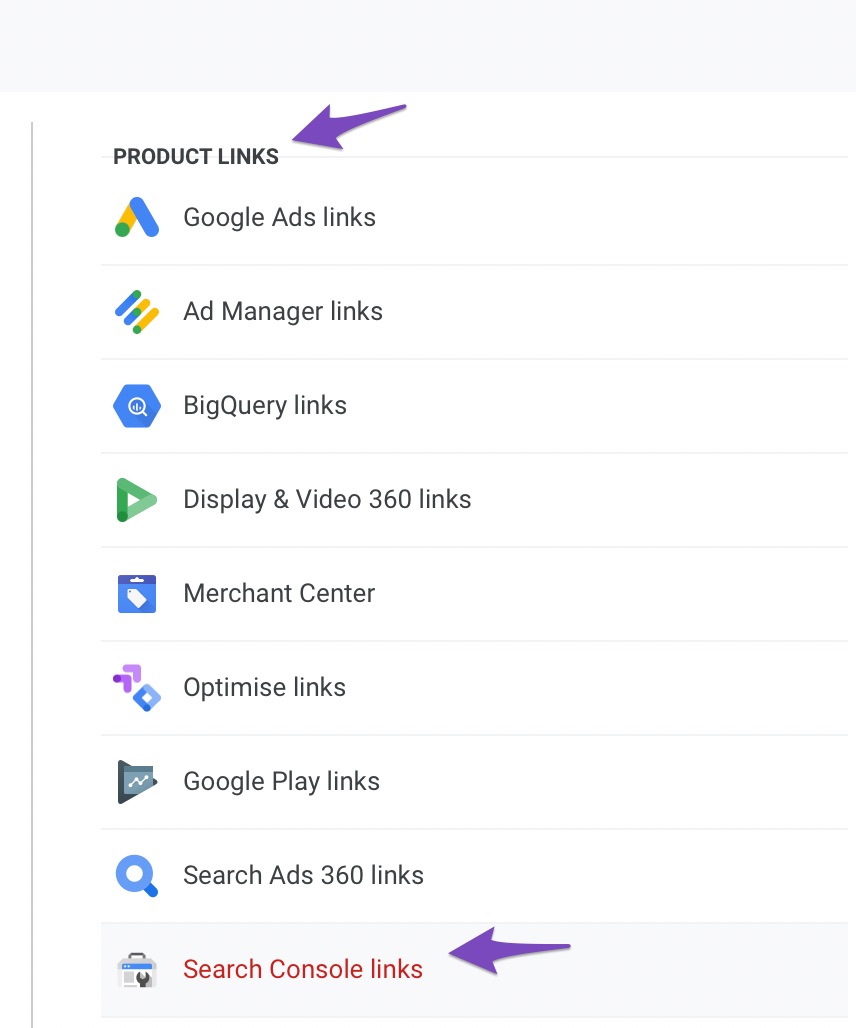
Next, click on the Link button.
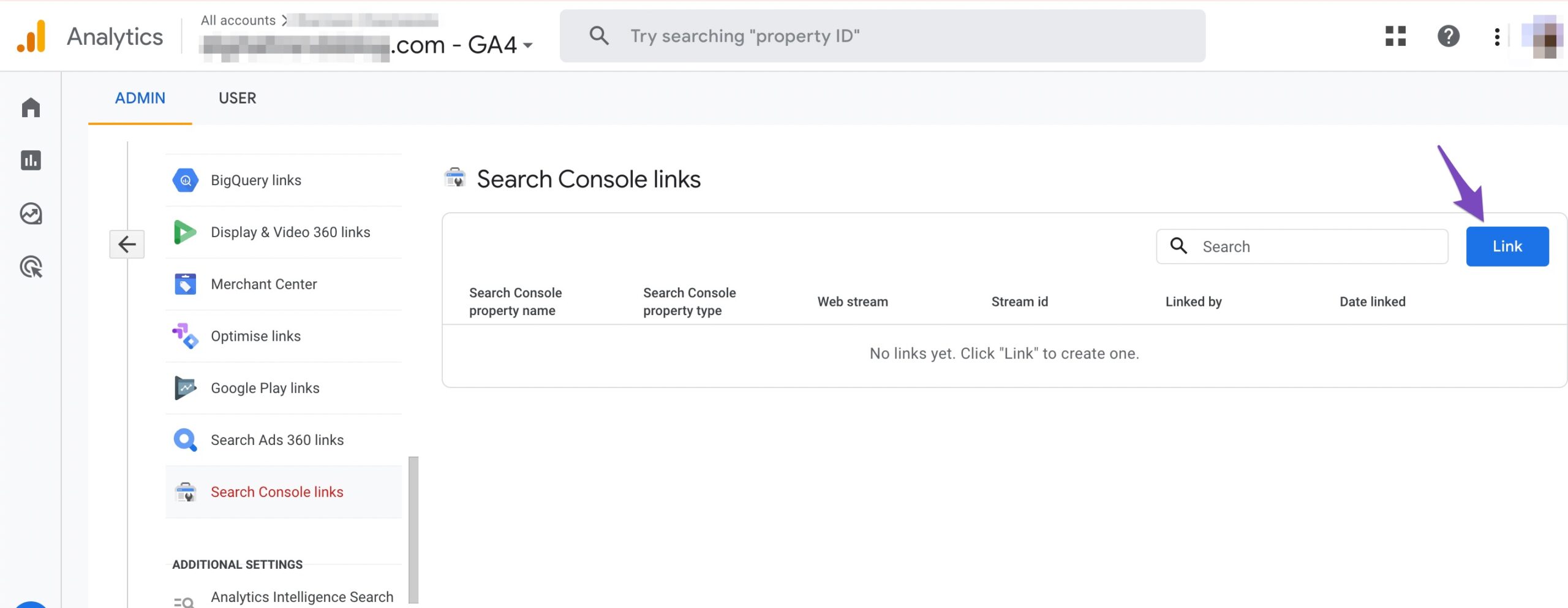
Click on Choose accounts, as shown below.
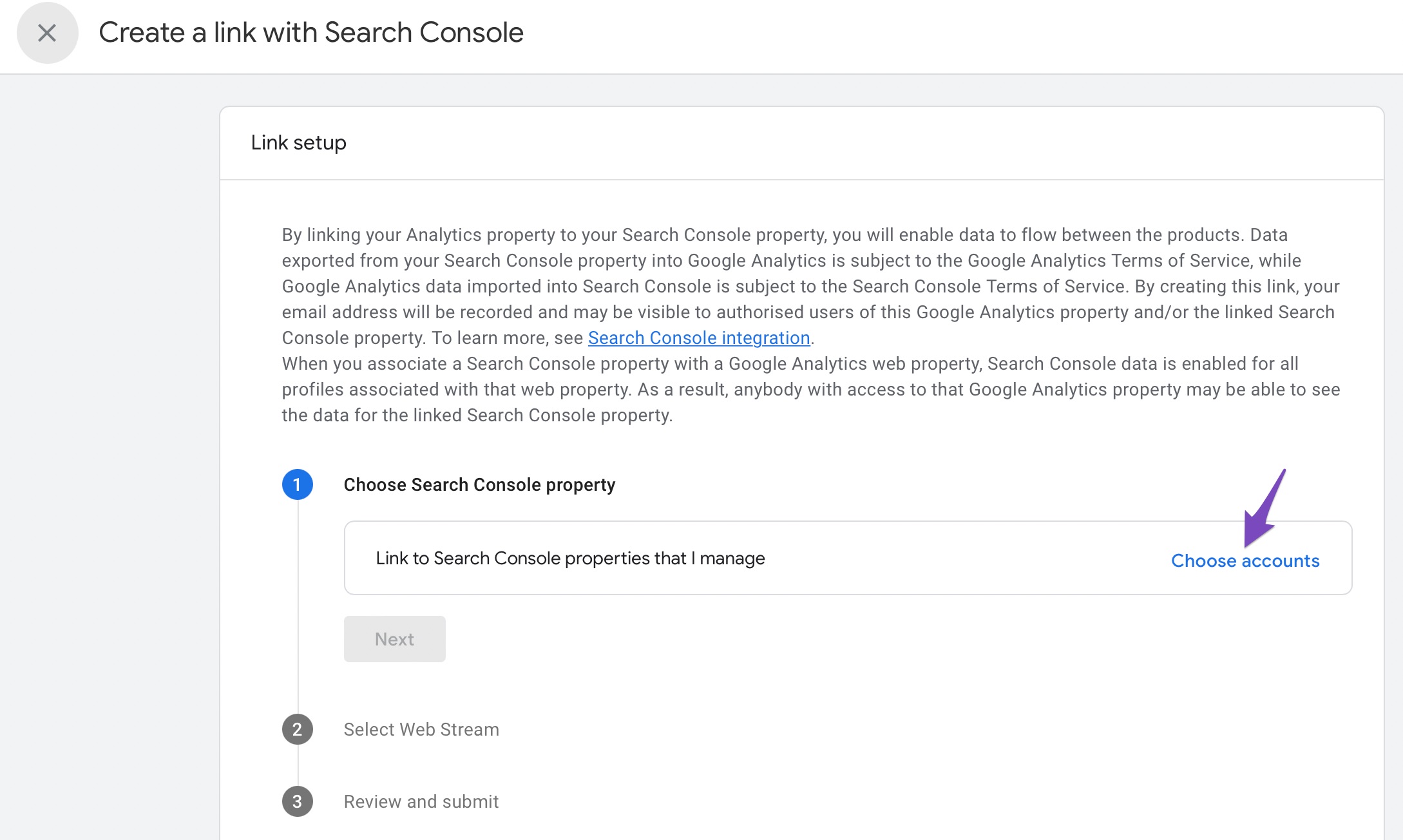
Select the property that you’d like to link to and click on the Confirm button.

Next, select the Web Stream (the website integrated with GA4) and review your selection. Click on the Submit button.
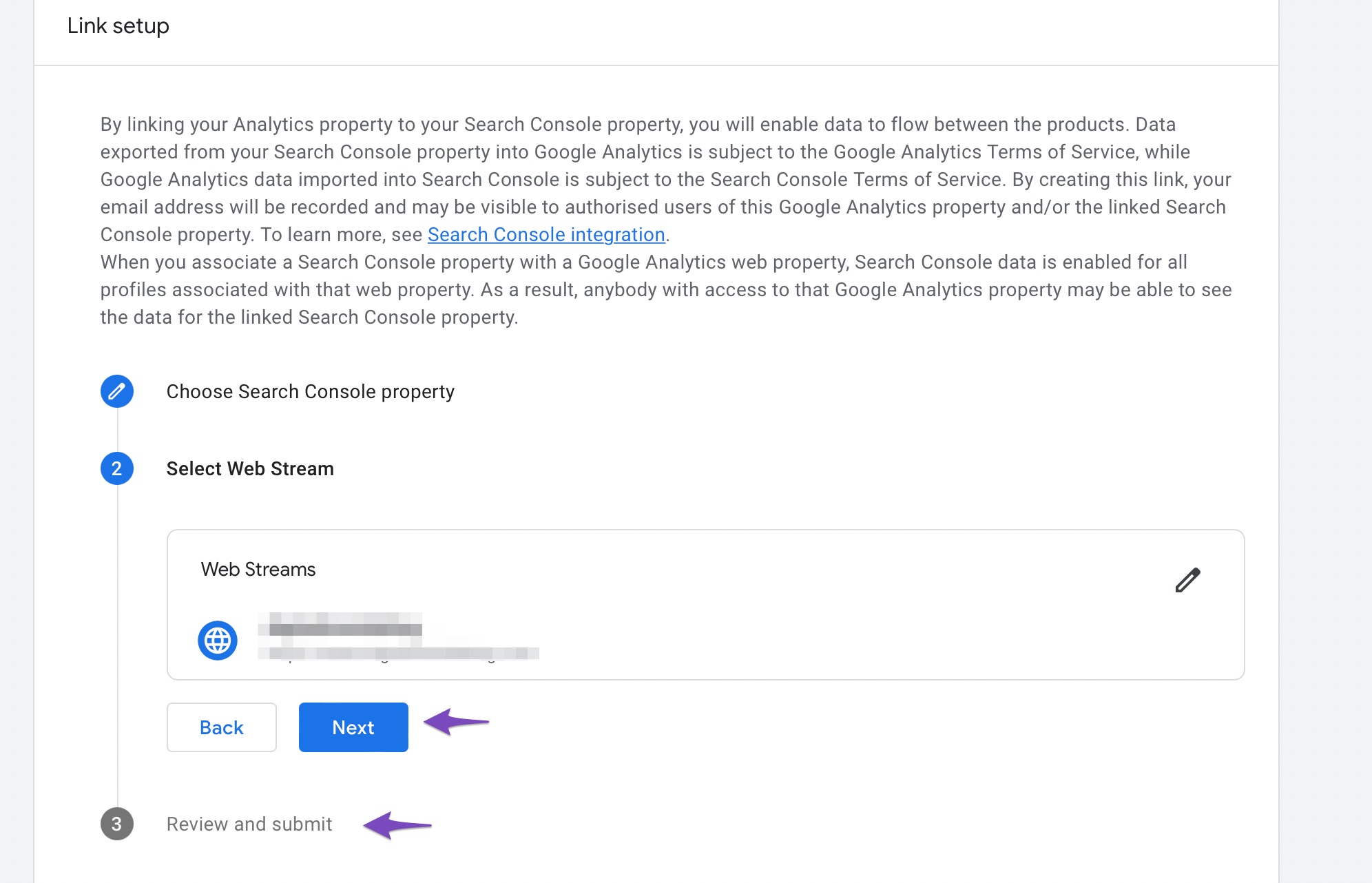
Your link will now be created.
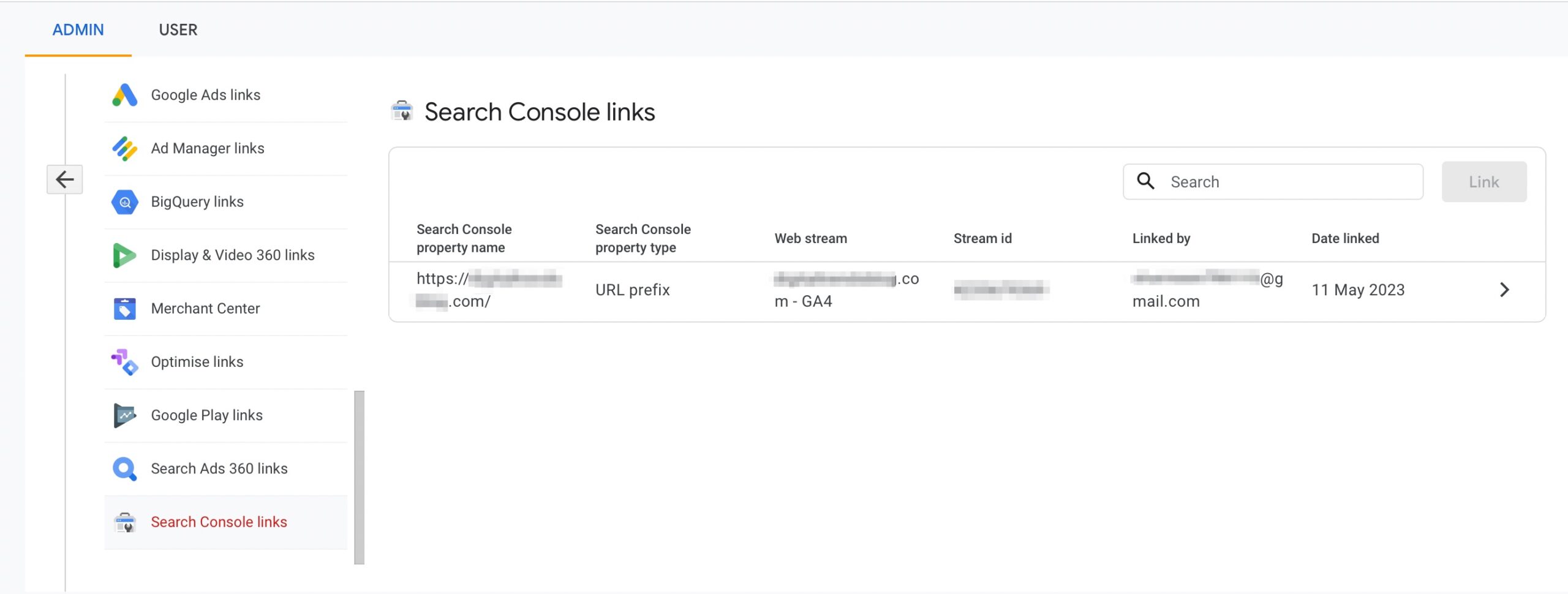
Note: You might have to wait for about 24 hours before seeing Google Search Console data in your reports.
2.1.3 Add the Google Search Console Report to GA4’s Report Navigation
By default, the Search Console collection of reports is unpublished. You’ll have to publish it within GA4 to see the Google Search Console report in your reports navigation.
To do so, navigate to Reports → Library from your GA4 dashboard, as shown below.
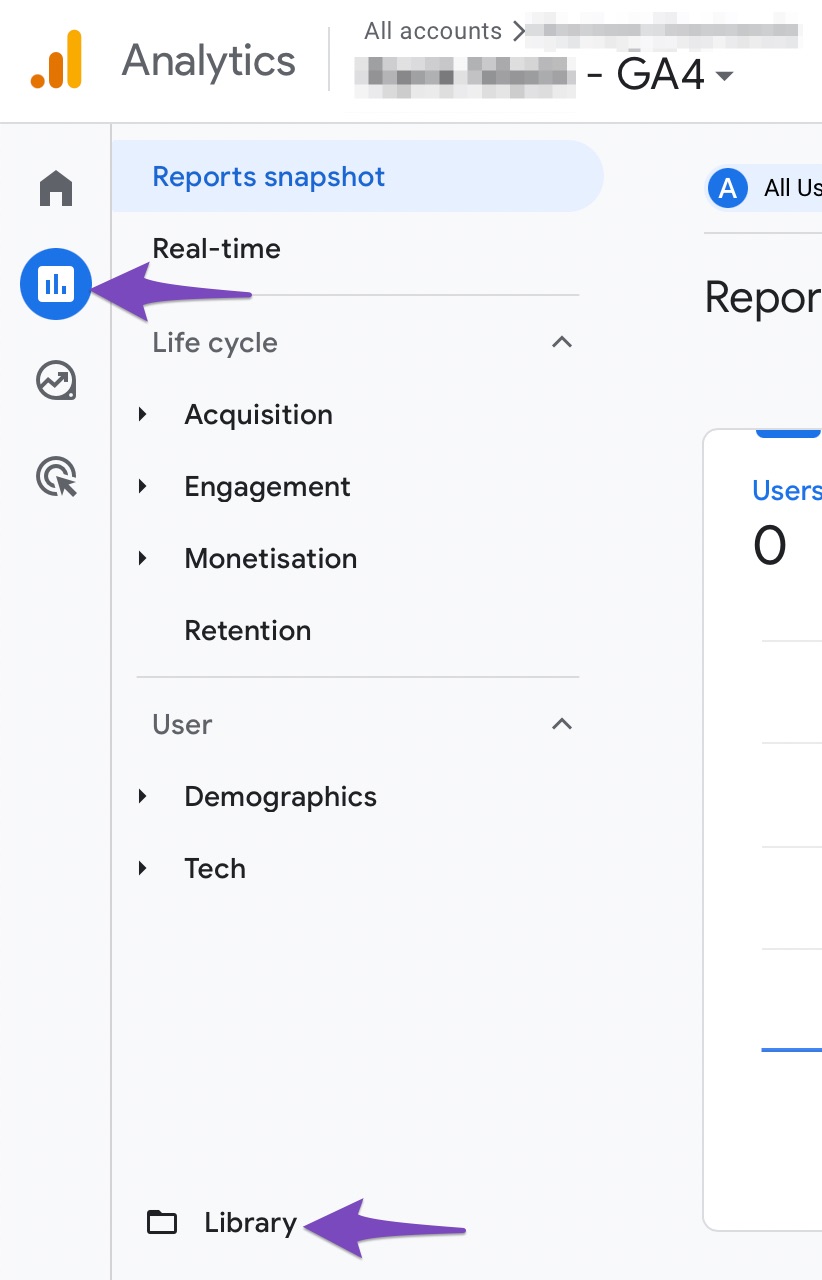
Now navigate to the Search Console card and click the 3 vertical dots. Select Publish, as shown below. You’ll have to wait a few seconds for the cards to appear.
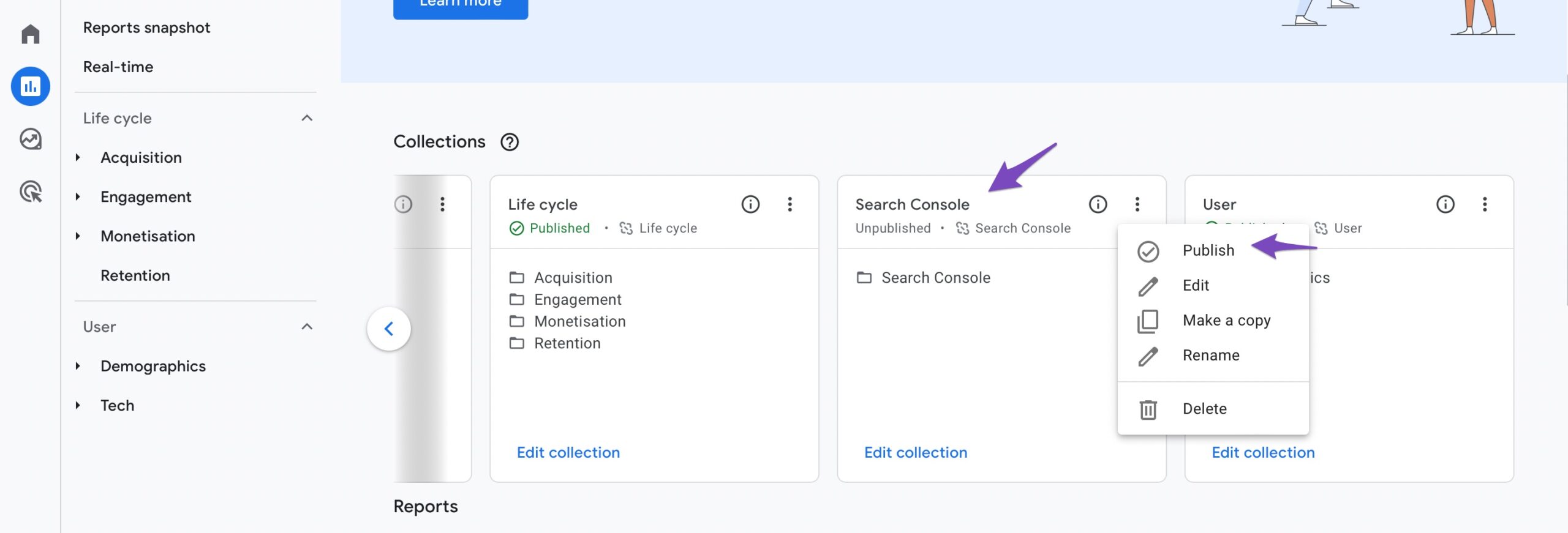
You’ll now be able to see the Search Console report in the Reports section.
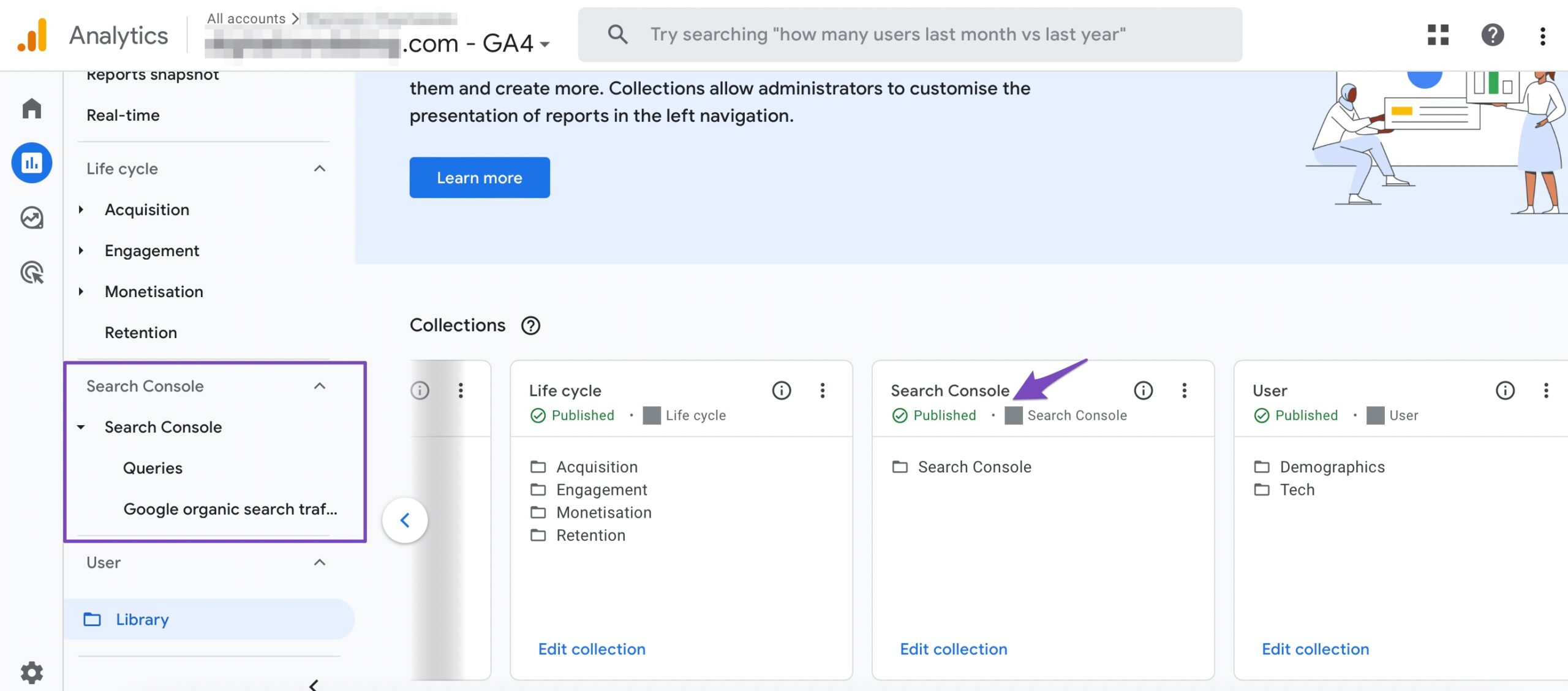
The integration adds two new reports available in your Google Analytics 4 property: Google organic search Queries and Google organic search traffic. We’ve discussed both of these reports below.
Google Organic Search Queries:
This report provides valuable insights into the keywords and phrases you’re using to find your website through organic search on Google. It helps you to understand how your users are discovering your site, what specific terms they’re using, and how these queries are driving traffic to your site.
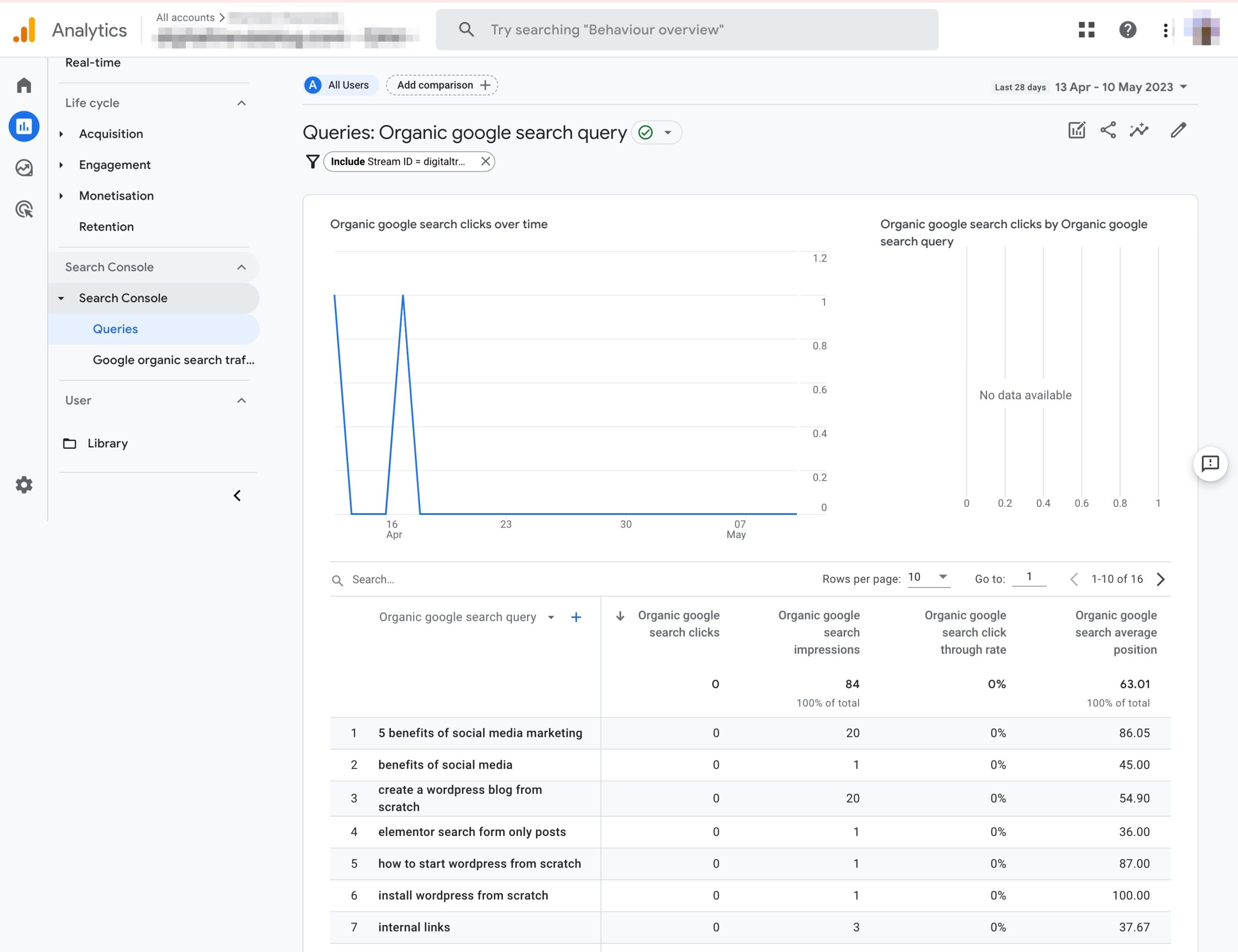
You can delve more deeply into the data by Search Console dimensions (but not by Analytics dimensions). Also, this data can be found in Search Console.
Google Organic Search Traffic:
This report displays landing pages with associated Search Console and Analytics metrics. You can dive deeper into the data by the Country and Device dimensions.
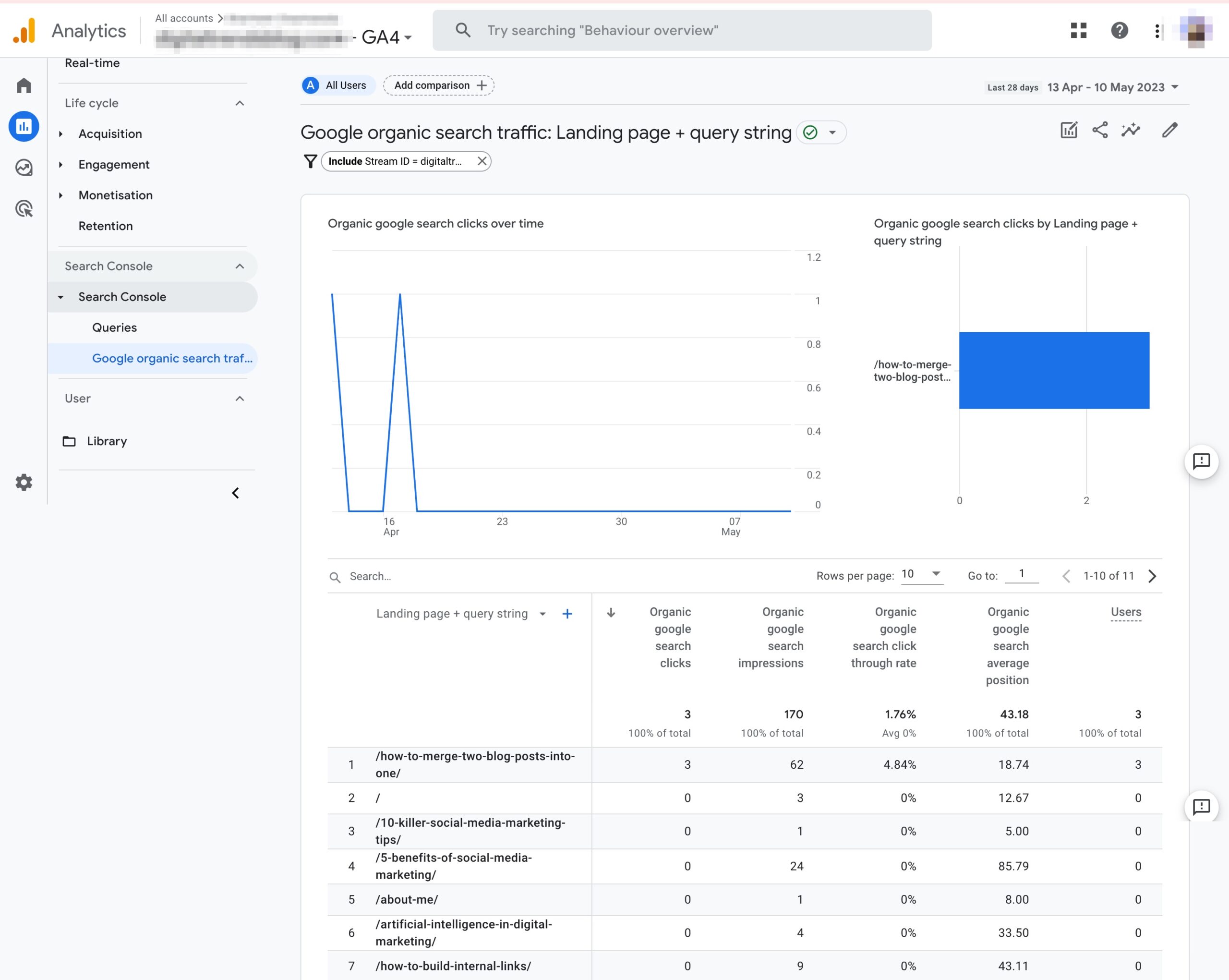
2.2 Use Google Search Console
You can see a list of all queries (keywords) that refer organic traffic to your site and the number of clicks, impressions, click-through rate, and position for each query in Google Search Console. To view the list of keywords in Google Search Console, navigate to the Performance section from your dashboard. Check the Queries column as shown below.

In the Queries section, you can view the list of all keywords and then improve the pages built around those keywords by taking on-page SEO steps to improve rankings using the high-volume search term.
3 How to Improve Your Ranking for Organic Keywords
Having your web pages rank high in Google’s organic search listings for significant keywords can be quite valuable for boosting site visitors. While Google’s search engine algorithm is continuously changing, here are some basic ideas to get you started on enhancing your search engine ranks for organic keywords.
3.1 Create Stellar Content
Many people seem to drop the ball when developing content with organic keywords. They are too focused on how many keywords can squeeze in and forget that real human beings will eventually read it.
However, it is always a good idea to prioritize high-quality content. When it comes to quality, don’t scrimp. Both search engines and users favour content that is truly unique and extremely helpful.
Make sure you’ve put time, effort, and thought into what you’re writing.
Then, as if it were frosting on a cake, sprinkle the keywords in as a bonus to increase your organic rankings. Finally, you’ll establish a reputation as a knowledgeable resource, which will assist you in enhancing your SERP rankings.
Rank Math’s Content AI helps you create SEO-friendly content and ensures that your content is worthy for search engines.
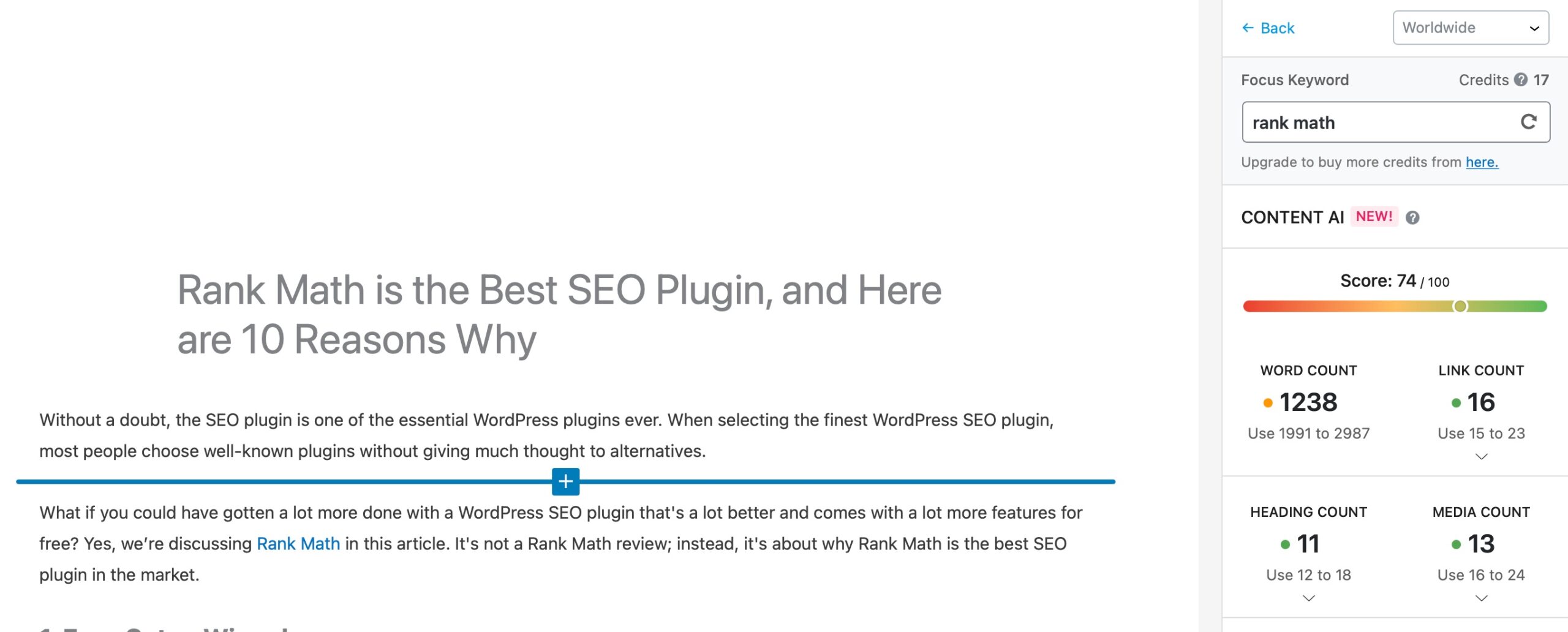
Keep in mind that creating high-quality content entices people’s attention and encourages them to share, thereby increasing traffic to your site. Good content has the best potential of going viral, and Google’s ranking algorithm greatly promotes viral content.
3.2 Avoid Keyword Stuffing
It’s tempting to want to utilize as many search terms as possible in your content once you regularly perform organic keyword research.
But there’s a reality check here: too much of a good thing is actually not a good thing.
A keyword stuffing example would be a page that is trying to rank for the term “best leather bag” and using the following copy:
“If you’re looking for the best leather bag, look no further. Our brand offers the best leather bag that you could want for business or pleasure. With a strap out to be padded and adjustable to accommodate cross-body or over-the-shoulder wear, this is the best leather bag for travel.”
In the above example, the copy goes overboard with the use of the keyword multiple times, thereby reducing the quality content.
3.3 Optimize the Page Titles and Metadata
An essential on-page SEO ranking factor for a web page is the meta title and description, commonly known as the page title and page description, respectively.
When people search for your query, it’s what appears in the Google search engine results page (SERP) for your web pages. As a result, you should include your core keyword in this area when optimizing your page titles.
For example, the page title and meta description for one of our knowledgebase articles, How To Fix Briefly Unavailable For Scheduled Maintenance Error In WordPress, look like this.

No matter how huge your website is, Rank Math’s Titles and Meta features will help you optimize the titles and metadata of all your content. Start by navigating to the Titles and Meta options by hovering over Rank Math’s settings in the WordPress dashboard and clicking Titles & Meta.
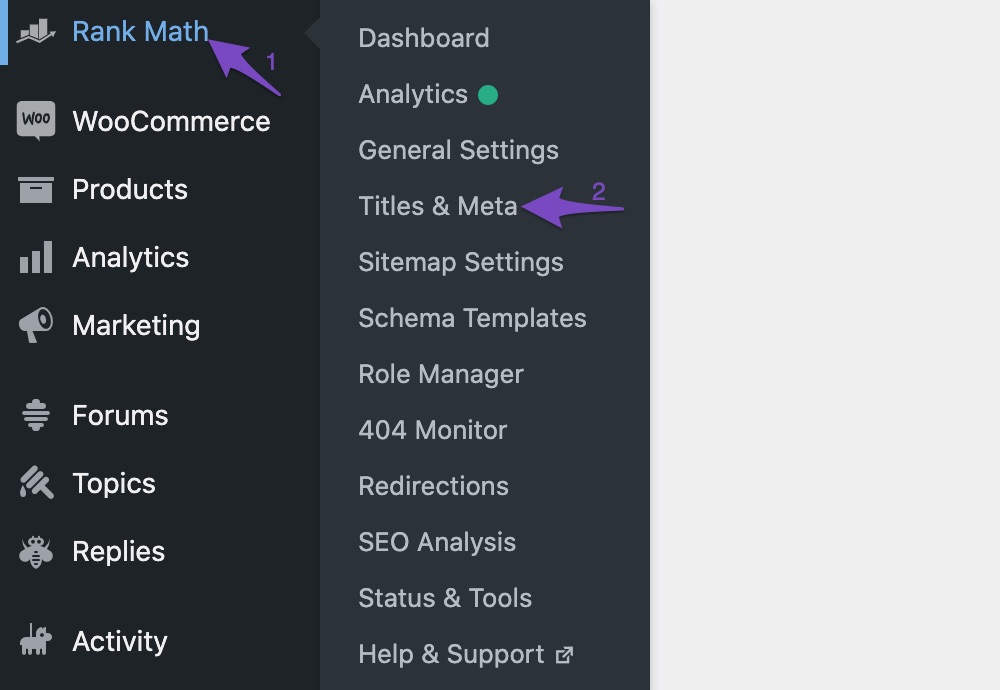
To improve your rankings, you must review your metadata and update it with new and relevant organic keywords.
3.4 Increase Internal and External Links
Internal links within the website and external links from other sites impact rankings. Seek ways to increase the page’s internal links, such as adding it to one or more of the navigation systems, and so on.
More importantly, seek opportunities to add links to the page from within the main body of the content on other pages, preferably pages that score well for other competitive terms. This should improve your ranks.
When using internal links, use anchor text in a close variation of your target keywords for the page. However, avoid using exact match terms excessively. Close variations will assist you in improving your organic Google ranks for your keywords.
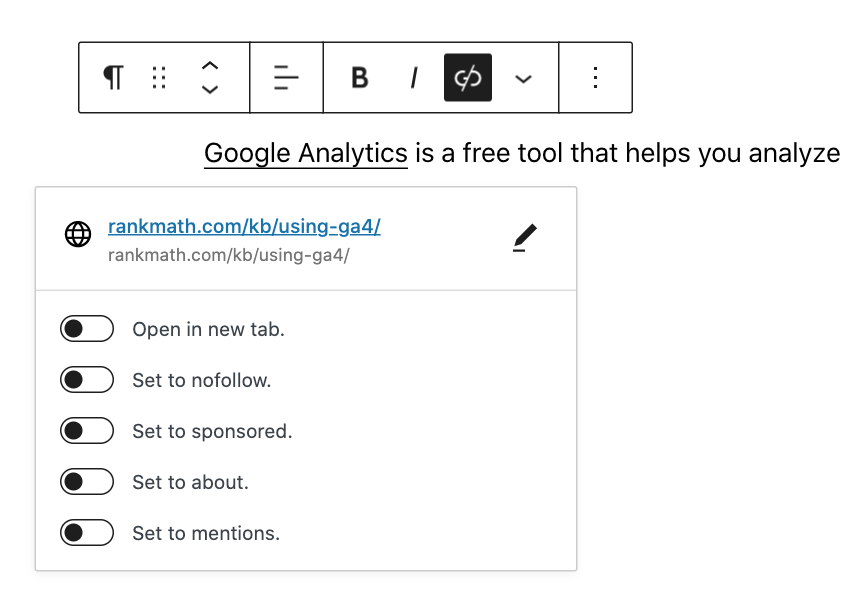
Remember that your human visitors come first: these links should only be inserted if they make sense for driving your readers to the page.
3.5 Add Alt Tags for the Image Links
For people who mouse over the image, those with slow connections, those who turn off image downloading, or the visually impaired who use page readers, Alt Tags for static images (images that are not used as links) are used to offer information about what is in the image.
When an image is used as a link, the alt tag should convey more information about what to expect when someone clicks on the image link.
If you can create keyword-rich Alt Tags for image links, you’ll be able to increase the page’s rankings where they’re embedded and the page to which they link. Rank Math offers some of the best image optimization features that’ll further help to improve your rankings. Ensure that you use a descriptive Alt tag with targeted keywords for that page.
3.6 Create Cornerstone Content
If you have ten pages, Google will have difficulty recognizing which page is relevant if they are all related to the same set of organic keywords. Instead, combine your material into a single cornerstone or pillar content. There will be no SEO confusion if you have one authoritative cornerstone page on a certain topic, and you will rank better.
You can easily add pillar content with Rank Math SEO. To do so, navigate to the General tab of Rank Math SEO, and then click on This post is Pillar Content, as shown below:
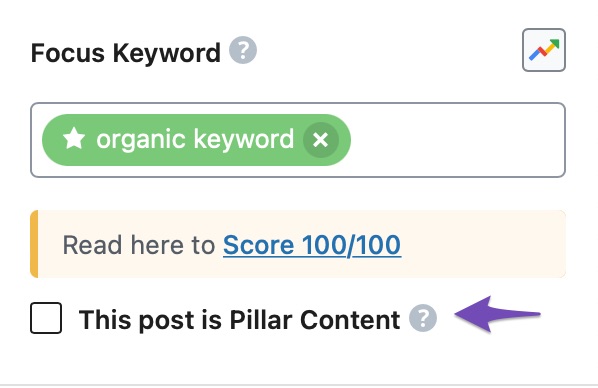
3.7 Your URLs Matter
Keep your URLs clear and relevant to the page, as search engines like human-readable URLs. Blocks of numbers and special characters should be avoided. Keep in mind that shorter URLs perform better in Google search rankings than longer ones. Reduce the amount of slashing in your URLs. Keywords should also be included in URL names.
3.8 Optimize and Update the Content
It’s always a good practice to optimize your existing texts. Include variations of organic keywords without forcing them into the text. Please use the keywords in a natural flow to not affect the readability.
The early placement of important keywords in page titles, headlines, and body text signals relevance; you should include them early in your page titles, headlines, and body text. Your focus keywords should be used frequently throughout your content but never at the expense of effective writing.
4 Conclusion
Ranking organically for keywords can make a significant impact on traffic and sales. It is, however, continually changing and requires ongoing attention.
It starts with writing unique, relevant content that includes the keywords you want to rank for. Securing top organic search engine rankings is winning only half the battle. It’s important to track the impact of your efforts on website traffic and lead/sales generation to demonstrate your worth and maximize your outcomes.
Google Search Console may provide valuable insight into how your site is performing and highlight potential faults that need to be addressed. Google Analytics is a useful tool for analyzing changes in search traffic, tracking your keywords, and tracking users’ interactions with your website. Set up Google Analytics statistics to see how your organic traffic converts to subscribers, leads, and customers.
So, now that you’ve made it this far start putting the ideas into action to ensure you see a week-over-week and month-over-month increase in organic search traffic and keep an eye on changes in your ranking for specific keywords that you know are important to your business.
If there’s anything else you’d like us to cover in this post, let us know by Tweeting @rankmathseo. 💬
